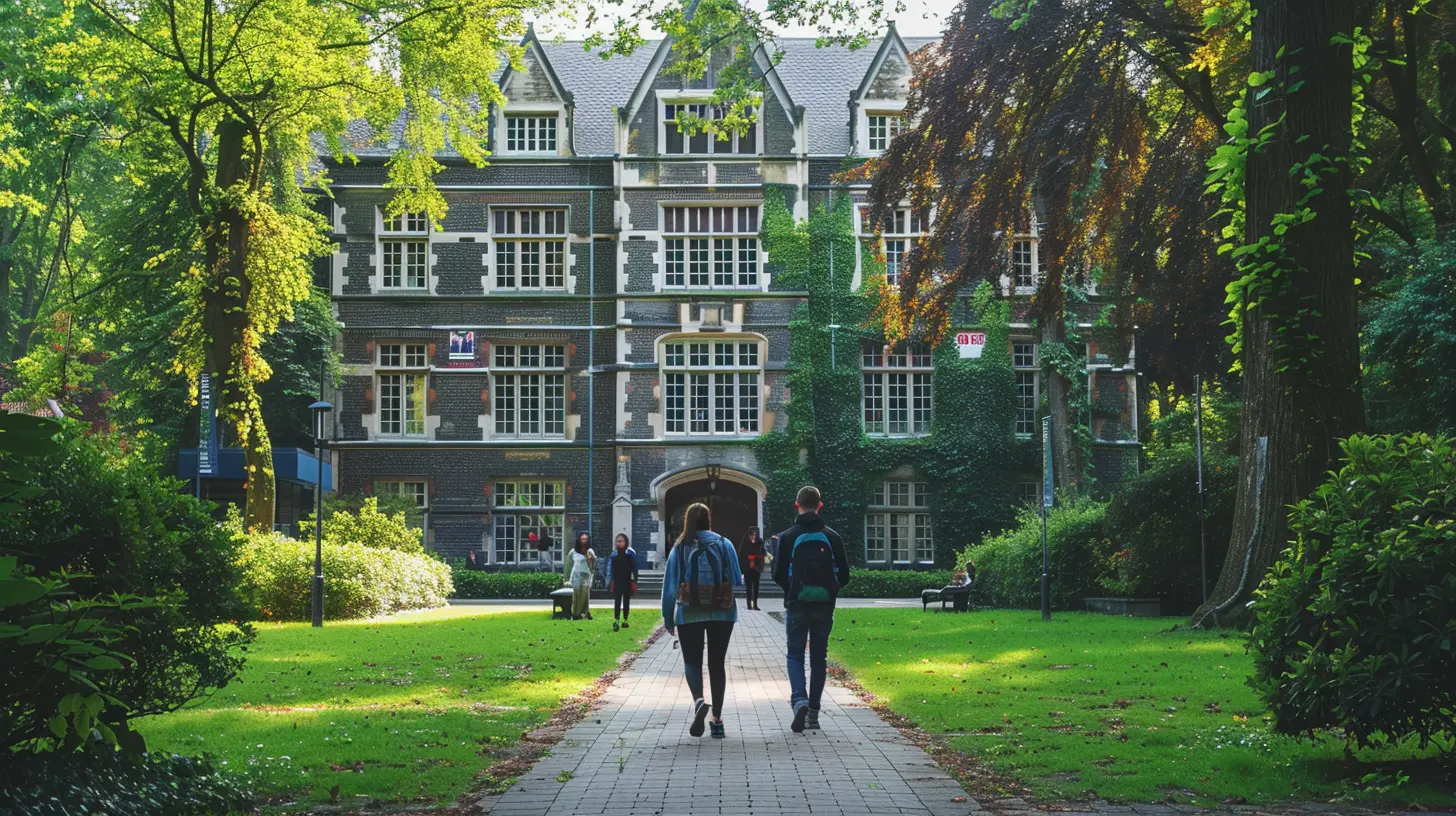Why You Should Consider Liberal Arts Colleges
7 August 2025
When you're sifting through your college options, big-name universities often take the spotlight. But let’s pump the brakes for a moment—have you ever thought about liberal arts colleges? If not, you're not alone. Liberal arts schools get overshadowed a lot, but they offer some seriously underrated perks that could change the way you experience college... and your future.
So, pull up a chair, grab your favorite snack, and let’s dive into why choosing a liberal arts college might just be the best decision you’ll ever make.
What Even Is a Liberal Arts College?
Okay, before we go any further, let’s clear something up. A liberal arts college is not about studying painting or drama all day (though you totally can if that's your jam). At its core, a liberal arts college offers a well-rounded education across the humanities, sciences, and social sciences.Think of it like a buffet—you don’t just eat one thing. You get a little bit of everything, and by the end of the meal (or in this case, your four years), you come out full and satisfied, with a broad plate of knowledge and skills.
1. Small Class Sizes = Big Opportunities
Ever sat in a class with 300 other students and thought, “I’m basically invisible here”? That’s not going to happen at a liberal arts college.The Power of Being Seen and Heard
Most liberal arts schools cap class sizes at 20 students or fewer. That means you'll actually get to know your professors—and more importantly, they’ll get to know you. You won’t just be a student ID number. You’ll be you, with your own voice and your own ideas.And guess what? That opens the door to:
- Personalized mentorship
- Hands-on research and projects
- Strong recommendation letters (because your professors know you well)
2. Flexibility to Discover (and Rediscover) Your Passions
Raise your hand if you're absolutely sure what you want to do with your life. No one? Thought so.No Need to Lock in a Life Path at 18
One of the biggest myths about college is that you need to have your entire career mapped out from day one. Liberal arts colleges throw that notion out the window. They actually want you to explore.You can take a class in philosophy, dip your toes into computer science, then realize you’re actually obsessed with environmental studies—and no one will bat an eye. That’s the norm.
This freedom lets you:
- Discover unexpected interests
- Combine disciplines (like bioethics or digital storytelling)
- Avoid the trap of a major that doesn’t genuinely excite you
3. The Emphasis on Critical Thinking, Not Just Memorization
Let’s be honest: anyone can memorize stuff. But can you think?More Than Job Training
Liberal arts colleges are all about developing your brain, not just preparing you for a specific job. They teach you how to analyze, question, write, argue (the good kind), and solve complex problems. Those are the skills that last a lifetime—long after that fancy textbook gathers dust.Employers love this, by the way. They know that liberal arts grads can:
- Communicate clearly
- Adapt to new challenges
- Work well with others
- Think independently
In a world that’s changing faster than ever, those traits are priceless.
4. Tight-Knit Communities That Feel Like Home
Going to college is a big life transition. Wouldn’t it be nice to feel like you actually belong somewhere?You're Not Just a Face in the Crowd
Liberal arts campuses tend to be smaller—think a few hundred to a few thousand students. That means you’ll see familiar faces often. You build real connections. It feels more like a community and less like a city.Clubs, events, sports, and dorm life are all easier to dive into when you’re not competing with 40,000 other students for attention or resources.
And let’s not overlook mental health: when people know you, they notice when you’re struggling. You’re not as likely to fall through the cracks.
5. Interdisciplinary Learning = Real-World Problem Solving
Spoiler alert: Life isn't divided into neat little categories. Neither are the problems we face—climate change, inequality, tech ethics, just to name a few.Connect the Dots
Liberal arts colleges are masters of interdisciplinary learning. You’ll learn how subjects interconnect. History influences politics. Biology overlaps with ethics. Computer science can be used to solve humanitarian issues.By learning to connect the dots, you become someone who can tackle real-world problems from multiple angles. That’s a rare (and very hireable) skill.
6. More Leadership Opportunities
At a massive state school, the student government is packed, the clubs are competitive, and getting your foot in the door can feel impossible.Step Into the Spotlight
At a liberal arts college, you're more likely to land leadership roles—whether it’s founding a club, leading a research project, or organizing campus events.Why does this matter? Leadership builds confidence. It helps you grow. And it looks pretty amazing on a resume. You get a chance to make a real impact, not just be a spectator.
7. Strong Alumni Networks That Actually Help You
Here's something not everyone tells you: your college’s alumni network can make your career.Real Support From Real People
Because liberal arts colleges are built on close relationships, their alumni are often extra involved. They’re more likely to mentor students, open internship doors, or even offer jobs.And here’s the kicker—they want to help because they’ve been where you are. That kind of community spirit doesn't fade after graduation.
8. A Foundation for Lifelong Learning
Let’s face it—jobs change, industries evolve, and new careers pop up every decade. You don’t just need to be job-ready. You need to be life-ready.Always Adaptable, Always Evolving
A liberal arts education trains you to be a lifelong learner. You’ll graduate knowing how to learn, which means you can pivot when needed—whether that’s switching careers or learning a new technology five years down the line.It’s like getting a mental Swiss Army knife: you’re prepared for anything.
9. Better Work-Life Balance in College
Burnout is real, folks. And the college grind can be brutal if you’re not careful.More Space to Breathe and Grow
Because of their smaller size and more personalized atmosphere, liberal arts colleges often foster healthier academic environments. You’re still challenged, but you're not drowning.And since professors really know you, they can help you manage the workload in a smarter, more supportive way. It’s okay to be human here.
10. Values-Driven Education
Let’s talk values. Liberal arts colleges often place a strong emphasis on ethics, community service, diversity, and global citizenship.Educating the Whole Person
You’re not just a future employee. You’re a whole person. Liberal arts schools want to help you become not just a thinker, but a doer and a contributor to society.So if you care about things like social justice, sustainability, or making a difference, this might be the kind of campus where you find your people—people who care about the same things.
Is a Liberal Arts College Right for You?
There’s no one-size-fits-all answer. But here’s a helpful checklist.- Do you love learning across subjects?
- Do you want professors who know your name?
- Are you open to exploring different paths before settling on one?
- Do you value community and connection?
- Do you want to grow as a thinker, not just a worker?
If you answered “yes” to most of those, a liberal arts college could be an ideal fit.
Final Thoughts: It's Not About Prestige—It's About Fit
Look, there’s no denying that big universities have their strengths. But prestige isn’t everything. What really matters is finding a place where you can thrive—academically, socially, emotionally, and professionally.Liberal arts colleges offer a unique, empowering, human-centered way to do college. They're about learning to live, not just living to learn.
So maybe... just maybe... it's time to rethink what “the right college” looks like.
all images in this post were generated using AI tools
Category:
College PreparationAuthor:

Olivia Lewis
Discussion
rate this article
1 comments
Savannah McKay
Absolutely loved this article! 🌟 Liberal arts colleges offer a unique, well-rounded education that fosters creativity and critical thinking. A fantastic choice for those seeking a vibrant, enriching college experience! 🎓✨
August 23, 2025 at 2:45 AM

Olivia Lewis
Thank you for your kind words! I'm glad you found the article insightful. Liberal arts colleges truly do provide a unique and enriching experience! 🌟


